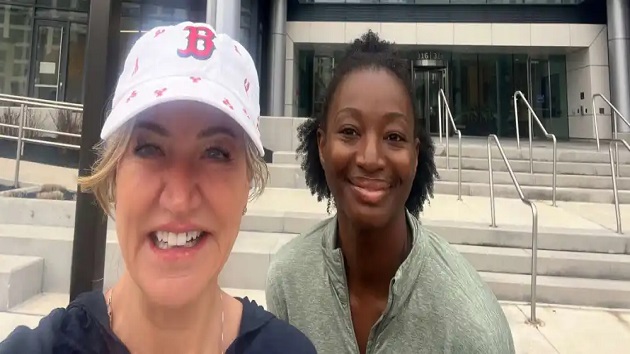(BOSTON) — A sickle cell disease center is leading the way in treatment with a new, innovative approach to caring for those with the illness.
Dr. Sharl Azar, Medical Director of the Comprehensive Sickle Cell Disease Treatment Center at Massachusetts General Hospital (MGH), hired a medical exercise specialist to work with their patients on fitness programs that will help improve their lives.
“One of the parts of the lore of this disease has been patients living with sickle cell disease can’t exercise or they shouldn’t, because exercising can exacerbate symptoms of their disease,” Azar told ABC News. “It can put them into the painful crises that are the hallmark of the illness.”
According to the Centers for Disease Control and Prevention (CDC), sickle cell disease is a red blood cell disorder, in which the affected individual has abnormally shaped red blood cells (sickle cells) rather than round ones because of abnormal hemoglobin, a protein that carries oxygen. Sickle cells perish early resulting in a shortage of red blood cells. They also block blood flow when they get clogged in vessels. The constricted blood flow can cause a crisis of agonizing pain for the patient.
That painful crisis is all too familiar to Amy Diawara, 27, who has had sickle cell disease her entire life. She said that a crisis feels like excruciating throbbing pains embedded deeply in the muscles of her body.
Diawara is a patient at MGH and worked with its medical exercise specialist Jen Miramontes on a personalized training program to run the Boston Athletic Association Half Marathon on Nov. 12.
“You need people that are going to want to ride with you to the finish line and I’m so grateful for Jen and Dr. Azar,” Diawara told ABC News. “They’ve encouraged me and this is how I’ve gotten to this point, and super excited to run the Boston half this Sunday.”
Miramontes, 59, isn’t only training Diawara, she agreed to run the race with her. She has competed in a total of 80 marathons throughout her life and created a training program specifically tailored to Diawara’s needs.
“We’re going to keep it at one mile, three times a week for the first two weeks,” Miramontes, who said she had to err on the side of caution when training Diawara, told ABC News. “Whereas, if I was training a person that did not have sickle cell disease, the process would have been probably two to three times faster to get to where we are [today].”
Other factors that Diawara had to be careful of were extreme heat and cold climates during her runs because dehydration and exceedingly cold temperatures could initiate a crisis, according to Miramontes. To avoid that, she instructed Diawara to run on treadmills during much of her training.
Miramontes was hired by the hospital through a grant, according to Azar. She was selected to offer medically approved fitness programs tailored to each patient she sees. Jen, who lives in California, flies to Massachusetts monthly to assess patients and create an exercise plan to meet each individual’s needs and goals. Afterward, she stays in constant communication and coaches the patients through virtual care, Azar said.
According to Azar, even though scientists have known about the genetic cause of sickle cell disease for over 100 years, population studies on the illness are far behind other chronic congenital diseases like cystic fibrosis or hemophilia. Azar says that is because sickle cell mostly affects people of color, resulting in the lack of adequate resources toward research for the illness.
According to the CDC, 100,000 people are living with sickle cell in the United States, but Azar says the data hasn’t been properly updated in decades. One out of every 365 African Americans are born with the disease and one in 13 African Americans are born with the trait inheriting a single copy of the sickle cell gene. If those numbers are expanded to today’s population of African Americans it should far exceed 100,000, according to Azar.
“It’s shameful to say that here we are in 2023, putting together the first program where we’re exploring the role of exercise in patients living with sickle cell disease.”
Most suffering from the disease have always been told not to overexert themselves with exercise because of a crisis risk, but Diawara and Miramontes are bucking the trend.
“I was shocked and just extremely disappointed to discover that there was very, very, very little research on exercise and sickle cell disease,” Miramontes said. “If you look up cancer, or MS [multiple sclerosis], or Parkinson’s and try to find research on how fitness can affect the disease, how it can impact positively the disease, you can find 1000s and 1000s of studies. I found two [for sickle cell]. And, so it’s certainly groundbreaking at a minimum.”
According to Azar, the Food and Drug Administration is set to make its first approval of a gene therapy product in December that will help to improve the lives of those with sickle cell disease. As for Diawara, she doesn’t think she’ll take the gene therapy treatment since she rarely has crises anymore. She’s more focused on her training and accomplishing her goal of running her first half marathon.
“I’m super excited because, again, this is something that I didn’t even think I could do,” Diawara said. “it’s always just been a dream. But now it’s like manifesting into an actual goal that’s about to be accomplished.”
Copyright © 2023, ABC Audio. All rights reserved.












